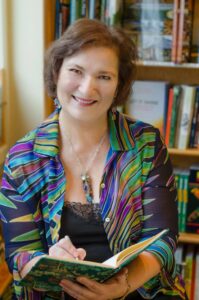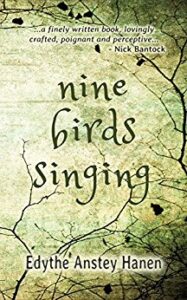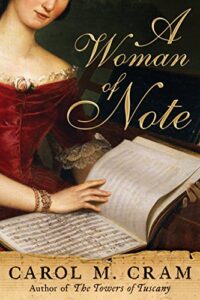
Successful hybrid author Carol M Cram enjoys the best of both worlds but is indie at heart
Formerly a writer of textbooks, Canadian author Carol M Cram has now become a highly successful historical novelist, in a fast-moving career that saw just three months between self-publishing her first novel and securing a trade publishing contract. Still thoroughly indie in spirit, she feels she enjoys the best of both worlds.
Key points to take away from her exclusive interview below are:
- most readers don't care how you're published – what matters most is satisfying and engaging readers
- writing in short bursts, with marketing and admin tasks sandwiched in between, can help sustain productivity
- what matters most is satisfying yourself with what you write before you unleash it on your readers
What’s your proudest achievement to date as an indie author?

Carol's debut novel is now published by Lake Union
I guess I’m more of a hybrid author because I have to admit that my proudest achievement was being offered a publishing contract from a US publisher for my debut novel, The Towers of Tuscany, three months after I self-published it. I was very committed to indie publishing – and I still am, so I thought long and hard about accepting the offer. I did so and am glad I did, but I chose indie again for the paperback edition of my third novel, and will probably stay indie for the next few titles.
I love the flexibility of being both traditionally published and indie published.
What’s the single best decision you ever made?
To stop trying to find an agent and take matters into my own hands – in other words, to go indie.
I remember thinking a few months before I published The Towers of Tuscany that I’d be 90 years old before I was published if I didn’t just get on with it and publish independently.
I finally realized that my goal as an author wasn’t to be published. My goal was to write a good book (or books) and to be read and enjoyed.
It sounds obvious now, but for many years I was convinced that success equalled publication. Nope.
Success equals having happy and engaged readers.
I wish I’d figured that out earlier in my career.
Another really great decision I made was to hire a professional photographer to provide me with a selection of five amazing photographs that I use for book jackets, on my website, on social media, and in promotional materials.
What’s been your biggest surprise as an indie author?
I was surprised to discover that readers aren’t really that concerned how you are published. Other writers and publishers care, but readers – not so much! Often when I speak at book clubs (I love doing that!), I’m asked explain the difference between traditional and indie publishing. People are really interested and often confirm that they don’t care how the book is published so long as it’s a good read.
What’s your greatest challenge – and how do you deal with it?
My greatest challenge is to be as productive as I think I should be.
I know that sounds a bit puritanical. However, even after completing and publishing three historical novels and writing huge chunks of three more novels since 2014, I never feel like I accomplish enough in a day because I spend many, many hours either doing marketing tasks or staring out the window.
Before writing novels full-time, I wrote textbooks for a living. I’ve since discovered that writing for a full eight or even ten-hour day isn’t particularly difficult compared to writing fiction. I still can’t get my head around the fact that the words don’t necessarily come as easily as I would like them to or think they should.
I’m slowly learning not to beat myself up if I don’t do “enough”, but it’s a daily challenge!
How do you get/stay in a creative mood?

Carol's second novel
I use an app called Freedom to turn off all the bothersome parts of the Internet such as social media, email, news sites, etc, while leaving on YouTube and access to research websites.
- I then go to YouTube and search for music using keywords such as “music for writing,” “inspirational music,” “music for focus,” etc. There are endless variations and hundreds of music videos to choose from. I sometimes also listen to my favourite classical music pieces – the second movement of Beethoven’s 7th Symphony is a particular favourite, especially when I’m writing an emotional scene.
- I tend to write in short bursts – thirty minutes on average, and then I take a step back from my standing desk to check my phone and walk around a bit. In the course of a day, I try to schedule several short bursts interspersed with business work – publishing, marketing, etc.
How do you remain productive/motivated?
I love working! There are days, of course, when I spend too much time on the couch reading other people’s novels, but most of the time I’m pretty productive.
I may not write as much as I’d like to write or think I should write in a day, but I almost always manage to fill the hours with work that at least relates to my writing career.
What’s your favourite thing about being an author–publisher?
- I love the freedom and the independence.
- I enjoy having control over what books I write and when I write them.
- I also like choosing my own editors and cover designers.
I have experience now with both traditional publishing and indie publishing and both are good. I think I’ve been lucky!
What are your top tips for other ALLis?

Carol's latest historical novel
Take control of your writing career regardless of how you are published. You are ultimately the only person you need to satisfy.
Your readers are important, of course, but you first need to write what you want to read and then make it as strong as you can for others to enjoy. I’d also advise ALLis to always hire at least one editor and preferably two to go through your work before you publish it. You also need to read, re-read, and then re-re-read your work until you are sure it’s as good as you can make it.
Never compromise on quality and professionalism. No writer can be successful without editors, in my opinion.
What’s next for you?

Carol also now runs a small press, publishing in various genres
I’m almost finished my fourth novel called Escape to Tuscany which is related to my first novel, The Towers of Tuscany, but is not actually a sequel. The sequel to Towers will be my fifth novel, another historical novel set in fourteenth-century Tuscany with the working title The Merchant of Siena. Together, novels 1, 4 and 5 will form a loosely-related Tuscan-themed trilogy.
Going forward, I plan to focus on two genres, women’s fiction and historical fiction, with perhaps the occasional foray into thrillers.
In addition to writing as much as I can over the next several years, I’m also working on building my small publishing business. I like working in partnership with authors to bring their novels into the world. My company is called New Arcadia Publishing and I’ve just published Nine Birds Singing, a poignant, gorgeously written work of literary fiction by Edythe Anstey Hanen that is already getting some critical acclaim. I’m on the look-out now for historical fiction, women’s fiction, and literary fiction, and non-fiction titles related to topics in the self-help, New Age, and communications areas.
#Selfpub success story: @CarolCram shares her top tips from her career as a bestselling historical novelist including advice about going hybrid Share on X






Hi Carol:
I am so happy for your breakthrough to success.
It is articles and success stories like yours that give the rest of us hope, one day, we can break through too.
Excellent interview! Thank you for sharing your observations and experiences. I found inspirational and encouraging as I struggle to find my own balance between marketing and writing. (wry grin) Good luck in striving to perfect your own between these two necessities!
Love this interview, Carol. This part really resonated with me: “It sounds obvious now, but for many years I was convinced that success equalled publication. Nope. Success equals having happy and engaged readers.”
So true–and I think you’re exactly right–if you write the book that you love and it’s the best that it can be, it will connect with readers. Another point you made about self-publishing vs. indie publishing and the fact that most readers don’t give a hoot is true also, and a refreshing reminder.
Looking forward to checking out your website now, and your books in the near future. Thanks again for the great post and bravo on your success!